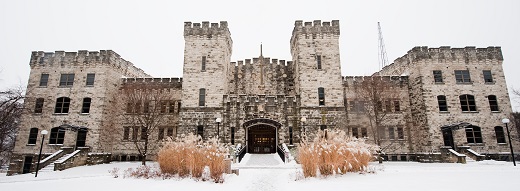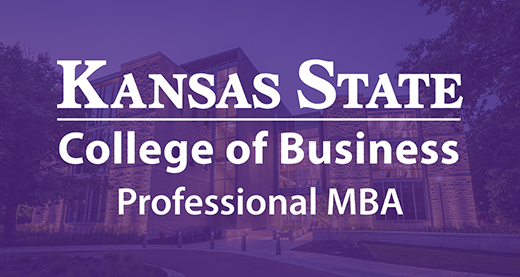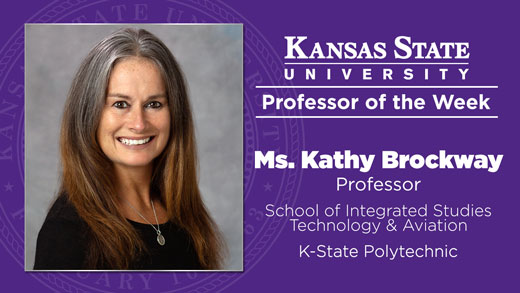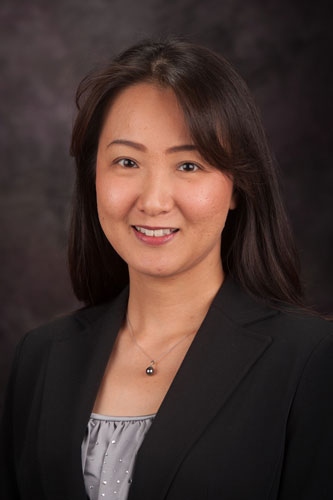01/22/20
K-State Current - January 22, 2020
K-State Current is a weekly news update for the Kansas Board of Regents to apprise the Regents on a few of the many successes and achievements made by K-State faculty, staff and students.
K-State News
 Robots will bring more learning opportunities to rural schools in Kansas, thanks to a national grant to be awarded to the Rural Education Center in the Kansas State University College of Education.
Robots will bring more learning opportunities to rural schools in Kansas, thanks to a national grant to be awarded to the Rural Education Center in the Kansas State University College of Education.
The U.S. Department of Agriculture has announced that the center will receive a $146,031 Teaching Rural Students STEM Through Telepresence grant designed to create a distance learning network to benefit rural schools, with emphasis on science, technology, engineering and math. Participating schools will be Ashland High School, USD 220; Clay Center High School, USD 379; Dighton High School, USD 482; Haviland K-8, USD 474; Lakin High School, USD 215; Liberal High School, USD 480; Skyline High School, USD 438; and Bennington High School and Tescott High School, both in USD 240.
"We recognize the tremendous potential that exists in our rural students and are excited to take the lead in infusing our district partners with this innovative approach to STEM education," said Debbie Mercer, dean of the College of Education.
The telepresence grant is part of the USDA's $42.5 million investment in 133 distance learning and telemedicine projects in 37 states and two U.S. territories. The USDA will provide the funding through the Distance Learning and Telemedicine grant program. These investments will benefit 5.4 million rural residents. In Kansas, the grant is expected to serve 2,360 rural students and 37,964 residents in rural communities.
The funds — used solely on equipment for the schools — will purchase 36 Double Robotics robots, which allow educators to teach and interact with their students who are at a different location. The schools will also receive Apple iPads and laptops, as well as other equipment necessary for the project.
"This grant will allow us to provide more STEM opportunities for student learning and teacher professional learning," said Spencer Clark, K-State associate professor of curriculum and instruction and director of the Rural Education Center. "We believe it could also possibly help address teacher vacancies in rural schools."
Jamie Wetig, superintendent of the Ashland Public Schools, said teacher supply is always an issue in rural schools and this partnership may impact what classes his schools can offer students.
"In an evermore challenging environment to recruit and retain highly qualified teachers, the ability to provide educational opportunities in a small and rural school may sometimes be limited," Wetig said. "By partnering with the Rural Education Center at Kansas State University, Ashland Public Schools will have the opportunity to work on the forefront in redesigning education from delivery to enhancing the curriculum. We look forward to expanding the opportunities afforded to USD 220 through the USDA telepresence grant and know this is just the beginning of using an innovative approach to support our students and our community."
Entering its fifth decade, the Center for Rural Education and Small Schools has been renamed the Rural Education Center. Along with Clark as its director, Lori Goodson, assistant professor of curriculum and instruction, serves as assistant director. This is the initial grant since Clark and Goodson assumed center leadership in spring 2019.
Approved by the Kansas Board of Regents in 1978, the center focuses on meeting the needs of rural schools in the state of Kansas. Clark and Goodson are emphasizing advocacy for rural schools and their communities by pursuing grant opportunities and other sources of funding to support various rural educational projects. They will also conduct research and coordinate other educational activities to support the learning opportunities for rural students and teachers. Clark and Goodson look forward to supporting current curriculum initiatives and goals associated with the Kansas State Department of Education school redesign, STEAM education, place-based education and civic engagement in rural schools.
Online Professional MBA ranked among nation's top 25 programs
 The online Professional Master of Business Administration program at Kansas State University was recently rated as the 25th best in the nation by U.S. News and World Report's 2020 Best Online MBA Programs.
The online Professional Master of Business Administration program at Kansas State University was recently rated as the 25th best in the nation by U.S. News and World Report's 2020 Best Online MBA Programs.
With this Top 25 ranking among the 321 programs considered, K-State's PMBA program is ranked first in the Big 12, first in Kansas, 19th for veterans and 20th among public universities. The latest ranking marks the program's highest since debuting at 95th in 2016, the first year the program was eligible to be included in the rankings, and significantly higher than last year's ranking of 58th.
"The goal has been to deliver a program that provides our students with the business education, tools and network to take their careers to higher levels," said Kevin Gwinner, Edgerley family dean of the K-State College of Business Administration. "Our rise in the rankings is indicative of our ability to not only fulfill this goal but also further evidence of our faculty's commitment to continuous improvement and supporting the academic success of our students."
The PMBA program was designed for professionals with at least three years of post-baccalaureate work experience who wish to earn their degrees online while simultaneously continuing to build successful careers. The program's quality is evidenced by its prestigious accreditation from the internationally recognized Association to Advance Collegiate Schools of Business, which is awarded to fewer than 5% of programs worldwide. Students receive instruction from the same faculty who are teaching K-State's on-campus MBA students and who are also actively engaged in research, which keeps the program's content current and immediately applicable to each student's day-to-day work life.
"To be recognized as a top 25 program in the country is a tremendous honor," said Chwen Sheu, associate dean for academic programs and faculty of distinction/Paul Edgerley chair in business administration. "The strong commitment to putting students first exhibited by our faculty and staff has resulted in our students receiving a meaningful, personalized experience throughout their programs of study. The connections they make last beyond the completion of their degrees."
Another unique feature of the program is the requirement for each student to participate in a faculty-led international business trip where participants observe the application of principles learned in their courses in an international setting and engage in cultural activities that can be life-changing.
"There is nothing like traveling abroad with students who may be experiencing their first opportunity to explore another culture beyond the U.S. or even their own state's borders," said Suzy Auten, director of the PMBA program since its launch. "Developing connections that cross the globe has been one of the most enjoyable aspects of my position. The lifelong friendships that emerge among the travelers and our hosts are inspiring, and the stories of how individuals have been personally impacted by their experiences are truly moving."
The program has rolling admission with five starts each year in January, March, June, August and October. Applications are due at least one month before the desired start date. To learn more about the program or to apply, visit k-state.edu/onlinemba.
K-State Faculty Highlights
Brockway recognized as Professor of the Week
 Kathy Brockway, business professor in the School of Integrated Studies at Kansas State University Polytechnic Campus, was recognized as Professor of the Week at the Jan. 14 men's home basketball game.
Kathy Brockway, business professor in the School of Integrated Studies at Kansas State University Polytechnic Campus, was recognized as Professor of the Week at the Jan. 14 men's home basketball game.
Brockway was recently selected as the 2019 recipient of the Marchbanks Memorial Award for Teaching Excellence. The accolade commemorates a Kansas State Polytechnic faculty member's commitment in the classroom, service to students and overall merit as a teacher.
An almost 20-year veteran of Kansas State Polytechnic, Brockway's teaching focus is in accounting and finance. One of her main goals with these subjects is to help students understand the role they play in real life, assigning projects in everything from retirement planning to budgeting and balancing a bank account, to filling out a tax return manually.
Additionally, Brockway assists with the campus's First Year program, co-teaches study abroad courses and is a club advisor. She also provides leadership training to corporations and organizations, an opportunity that allows her to explore what's going on in the industry so she can bring back cutting-edge and critical information to the classroom.
A native of Great Bend, Brockway studied business administration at Kansas State University and has a Master of Accountancy, also from K-State. After graduation, Brockway moved to New Mexico where she worked as an auditor and earned her certified public accountant license. When her family returned to Kansas, she was an accountant for a hospital and taught at Fort Riley before teaching at K-State for 10 years and then at Kansas State Polytechnic in 2001.
The Professor of the Week recognition is coordinated by Faculty Senate, the president's office, K-State Athletics and the Division of Communications and Marketing. Recipients are faculty members selected by Faculty Senate caucuses. Those selected are provided tickets to a men's home basketball game of their choosing and are recognized during halftime. This is just a small token of appreciation for those who teach at K-State.
Communication studies professor Soo-Hye Han wins 2019 Roderick P. Hart Outstanding Book Award
 Soo-Hye Han, associate professor of communication studies, won the 2019 Roderick P. Hart Outstanding Book Award for her book, "Votes That Count and Voters Who Don’t: How Journalists Sideline Electoral Participation (Without Even Knowing It)." Han co-authored it with Sharon Jarvis at the University of Texas and the book is published by Penn State University Press, 2018.
Soo-Hye Han, associate professor of communication studies, won the 2019 Roderick P. Hart Outstanding Book Award for her book, "Votes That Count and Voters Who Don’t: How Journalists Sideline Electoral Participation (Without Even Knowing It)." Han co-authored it with Sharon Jarvis at the University of Texas and the book is published by Penn State University Press, 2018.
The award was presented by the Political Communication Division of the National Communication Association at its annual conference held in Baltimore, Maryland. This prestigious award is given annually to recognize the authors of an outstanding book in the field of political communication published in the previous two years.
This book takes a mixed-method approach to study the linguistic cues surrounding voting in the United States. It tracks not only how journalists have told the story of electoral participation but also how individuals respond to two key portrayals in coverage. Findings are taken from multiple studies, including a content analysis of decades' worth of presidential election cycle new articles, focus group research, an experimental study, and interviews with more than 50 journalists and news professionals on how the story of electoral participation might be told in ways that meet, and support, both democratic and journalistic values.
Here are some of what reviewers have had to say on the book:
"Why are reporters constantly tempted to predict — or even to declare — election results before people even vote? In this fascinating book, Jarvis and Han identify a growing attitude of dismissiveness that echoes academic research on easily manipulated citizens and reinforces the public's cynicism about democracy. They show that this condescension has serious consequences. The authors' analytical rigor is matched by their respect and concern for everyday people: a rare and worthy combination." — Peter Levine, author of "We Are the Ones We Have Been Waiting For: The Promise of Civic Renewal in America."
"'Votes That Count and Voters Who Don't' will be invaluable reading for scholars, journalists, and citizens who care about elections — not just about who wins them, or the microscopic analysis of voting behavior, but about the fundamental exercise of power that elections represent. Jarvis and Han show us how it matters when journalists portray voters as those who are acted upon rather than as empowered democratic actors." — Regina G. Lawrence, executive director, George S. Turnbull Portland Center and Agora Journalism Center, University of Oregon.
K-State Student News
APDesign landscape architecture students receive international design recognition
 Three landscape architecture graduate students from the College of Architecture, Planning & Design, or APDesign, landscape architecture and regional & community planning department earned a coveted honorable mention award in the NPO Asian Institute of Low Carbon Design at the ninth annual International Student Design Competition.
Three landscape architecture graduate students from the College of Architecture, Planning & Design, or APDesign, landscape architecture and regional & community planning department earned a coveted honorable mention award in the NPO Asian Institute of Low Carbon Design at the ninth annual International Student Design Competition.
The theme of the 2019 competition, "Less is MOji — REboot the City," challenged students to addresses the problem of urban shrinkage in the Mojiko area in Kitakyushu, Japan. The competition asked students to redesign the urban landscape and to make a proposal for a low carbon urban project within this area. Urban shrinkage was considered as a real problem for the targeted area and the city of Kitakyushu.
Students were required to choose either the whole area of Mojiko or only one specific part. All proposals were required to contain one or more of the following features: urban shrinkage, low carbon city concept, overall sustainable concept, green space design, usage of renewable energy systems, sustainable transport systems, connection to the surrounding area.
Members from the APDesign team are all in the Master of Landscape Architecture program: James Ryan, team leader and fourth-year student, Kansas City, Missouri; Grant Pasowicz, fourth-year student, Overland Park; and Caleb Parker, fifth-year student, Haysville. The team represented APDesign and Kansas State University well and were the only team from the United States to earn recognition. View full-size images of the students' designs: Image 1, image 2, image 3 and image 4.
"I am very proud of our students for this recognition on an international sale," said Hyung Jin Kim, associate professor and advisor to the students. "They have been very responsive, dedicated and committed to their work. Although understanding very different sociocultural and environmental contexts of a Japanese city was a big challenge to them, students were able to come up with a creative solution for rebooting the existing city to their long-range city model which allows a highly compact human settlement as well as an abundantly restored ecosystem. I find it personally rewarding as I see our students develop ideas and skills over time and increase their confidence in competition. You'd be surprised how far they get you!"
The selection jury was represented by Bart Dewancker, jury chairman and professor at the University of Kitakyushu, Japan; and international jury: Zhu Wang, professor at Zhejiang University, China; Yue Fan, professor at Dalian University of Technology, China; Dian Zhou, professor at Xian Jiaotong University, China; Yiyin Tsai, professor at Chung Hua University, Taiwan; Mochamad Donny Koerniawan, Institut Teknologi Bandung, Indonesia; Fritz Akhmad Nuzir, Bandar Lampung University, Indonesia; Tanaphoom Wongbumru, Rajamangala University of Technology Thanyaburi, Thailand; and Hiroatsu Fukuda, professor at the University of Kitakyushu, Japan.
Asian Institute of Low Carbon Design is a nonprofit, academic-based organization made as a network of students, researchers, and universities especially in Asia to enhance their knowledge in their fields of study or works which is related to the environment. This organization explores the emergence of innovative ideas and practices within the context of international low carbon city planning and architecture issues. The institute is designed as a primary means to investigate the ideas about responding to those issues highly related to the environment.